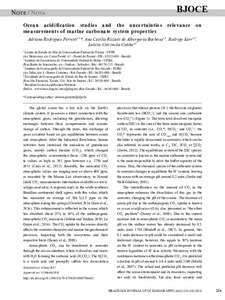Ocean acidification studies and the uncertainties relevance on measurements of marine carbonate system properties.

View/
Average rating
votes
Date
2018Author
Perretti, Adriana Rodrigues
Albergaria-Barbosa, Ana Cecília Rizzatti de
Kerr, Rodrigo
Cunha, Leticia Cotrim da
Metadata
Show full item recordAbstract
The global ocean has a key role on the Earth's climate system. It possesses a direct connection with the atmospheric gases, including the greenhouses, allowing exchanges between those compartments and oceanic storage of carbon. Through the years, this exchange of gases occurred based on gas equilibrium between ocean and atmosphere. After the Industrial Revolution, human activities have increased the emissions of greenhouse gases, mainly carbon dioxide (CO2), which changed the atmospheric concentration from ~280 ppm of CO2 to values as high as 391 ppm between c.a. 1750 and 2011 (Ciais et al., 2013). Recently, the measured CO2 atmospheric values are ranging near or above 400 ppm, as recorded by the Mauna Loa observatory, in Hawaii (daily CO2 measurements information available on www.scripps.ucsd.edu). A regional study in the south-southeast Brazilian continental shelf agrees with this value, which has measured an average of 396.7±2.5 ppm in the atmosphere during the spring of October 201.....
Journal
Brazilian Journal of OceanographyVolume
66Issue
2Page Range
pp.234-242Document Language
enSustainable Development Goals (SDG)
14.3Essential Ocean Variables (EOV)
Inorganic carbonBest Practice Type
GuideDOI Original
10.1590/s1679-87592018000706602Citation
Perretti, A.R.; Albergaria-Barbosa, A.C.R.de,; Kerr, R. and Cunha, L.C.da (2018) Ocean acidification studies and the uncertainties relevance on measurements of marine carbonate system properties. Brazilian Journal of Oceanography, 66(2), pp.234-242. DOI:10.1590/s1679-87592018000706602Collections
The following license files are associated with this item:
 Repository of community practices in Ocean Research, Applications and Data/Information Management
Repository of community practices in Ocean Research, Applications and Data/Information Management
